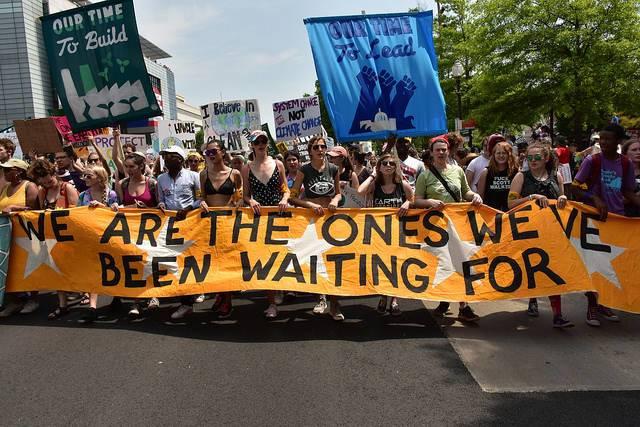
By Tom Szaky
Saturday marked 100 days in office for U.S. President Donald J. Trump. The benchmark coincided with the return of the People's Climate March, where over 300,000 demonstrators across the nation called for action on global warming. And it came seven days after the international March for Science, the kick-off to a Week of Action beginning on Earth Day.
Given the environmental platform upon which the president campaigned last year, it was clear that a President Trump would significantly alter the direction taken by the previous administration. One pre-election promise was the cancellation or renegotiation of American participation in the Paris climate agreement; the administration recently pushed back meetings scheduled to decide the U.S. stance on the deal.
Back in March, Trump signed an executive order to review the Clean Power Plan for the purpose of ultimately dismantling it. Last week a federal judge agreed to delay pending litigation of the plan at the behest of the Trump administration, keeping the plan sidelined while the White House works to repeal it. So far, the president and his new cabinet have made moves on several regulations and initiatives that make good on campaign promises and have real implications for environmental policy and global action plans for sustainability.
The current climate (some pun intended) raises the question of how environmentally-minded organizations may operate under the new direction favored by this administration.
Will a Trump presidency negatively affect non-governmental organizations (NGOs) and nonprofits dedicated to a policy agenda that supports science-backed policy for regulating energy production, emissions standards and environmental protection? The deep irony is that the answer is no.
Some NGOs partnered with the folks who organized the nationwide climate marches, including the Sierra Club, the NAACP and the Natural Resources Defense Council. On missions for social justice, environmental equity and more sustainable socioeconomic systems, these organizations function by circumventing the economic and structural limitations of public governmental programs. This is to say that because these not-for-profit organizations are independent from government, they are able to work for policy change and special interests where the government is insufficient.
For example, as it stands in the U.S. and most countries around the world, public works sees most “waste” outputs falling outside the scope of recyclability (aka resource recovery), tracking them for landfilling or incineration. This is because the value of most items cannot be sold on back-end channels for more than the cost of collection, logistics and processing in these publicly funded systems, providing no economic incentive to recycle them because of the lack of profit.
However, a report from the World Economic Forum and the Ellen MacArthur Foundation revealed that since most plastic packaging is used only once, 95 percent of the value of plastic packaging material -- worth $80 billion to $120 billion annually -- is lost to the economy.
Diverting potentially valuable resources from being lost to the economy requires its own set of resources that the public system does not currently have. NGOs are in the position to raise funding independently or work with companies, manufacturers and major brands to sponsor solutions for difficult-to-recycle waste streams. And they can effectively provide the technology, infrastructure, logistics, and funding to recover materials and feed them back into the value system.
Many NGOs are funded by donations and run by volunteers. The dismantling of public and government systems (i.e. the EPA) may have created a situation where people are more active in stewardship. Consumers are more likely to donate money and time than they were in previous administrations, when people expected the government to concern themselves with these matters.
This presidency will make clear that innovations do not suffer, but flourish, under new conditions set forth by public administrations. NGOs have the opportunity to step up their ideological initiatives despite decreased social and environmental regulations, acting as advocates and problem-solvers in the face of rising expectations.
Because the thing is, the Climate March was long planned to occur 100 days into the first term of the 45th President of the United States, whether that president was Donald Trump, Hillary Clinton or a third-party candidate.
The first Climate March hit the streets on the eve of the 2014 U.N. Climate Summit in New York City. Over 100,000 demonstrators demanded “bold and urgent action of the global climate crisis” by addressing “a commitment to the fights for economic and racial justice.” At the time, it was the largest climate change demonstration in history. And the People's Climate Movement gained momentum over the course of two American presidencies, providing leadership and building a platform.
Climate change and global warming are not Trump’s fault. But his administration is acting in support of fossil fuels, deregulation of industry and practices that continue to drive the planet in an unsustainable direction. I am optimistic that environmental NGOs, in their dedication to accelerating policy built upon evidence-based science, will remain on track and serve as examples for other entities in both the public and private sectors.
Image credit: Flickr/Amaury Laporte
Tom Szaky is the founder and CEO of TerraCycle, a global leader in the collection and repurposing of otherwise non-recyclable pre and post-consumer waste. TerraCycle operates in 21 countries, working with the world’s largest brands and companies to create national platforms to recycle products and packaging that currently go to landfill or incineration.
TriplePundit has published articles from over 1000 contributors. If you'd like to be a guest author, please get in touch!














